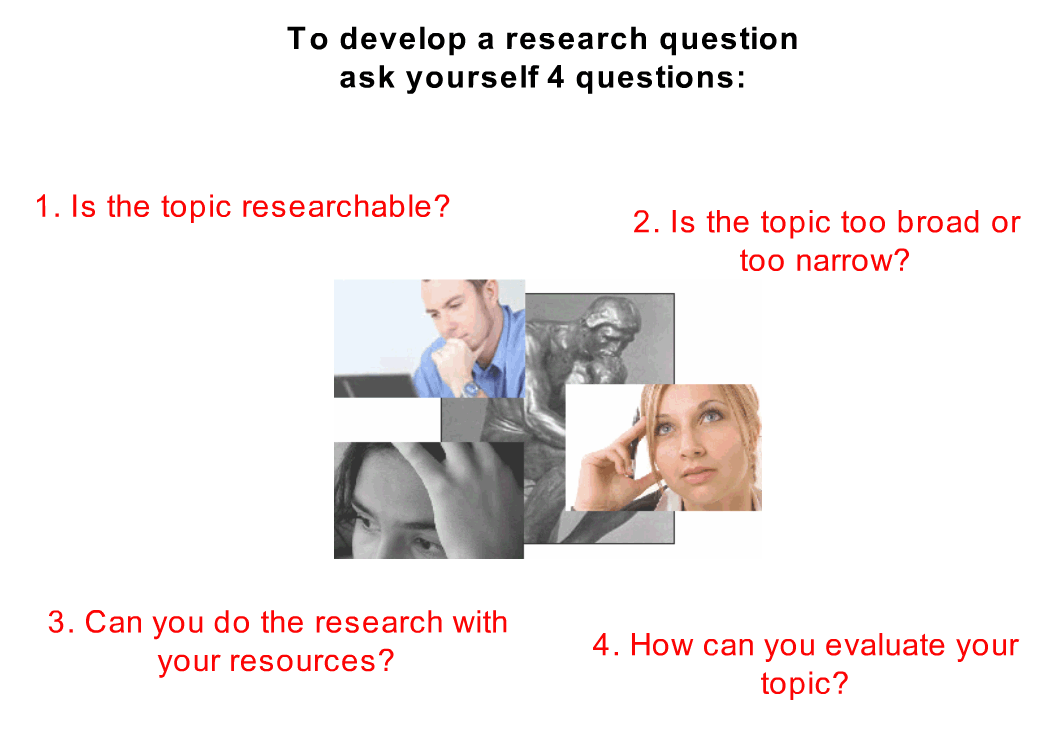
| Communication Research Lab Week 2 - Research Ethics, the National Ethics Application Form, using library databases cont. |
You tutor should ask every student in class to explain what their individual topic of interest will be for the remainder of the semester.
Please make sure that the topic is amenable to using survey research. In other words if your topic is drink driving in Sydney, then the survey would best be structured to discover what people THINK and FEEL about drink driving, as opposed to how people act when they are drunk. Behavioural questions are certainly possible to ask, but many people lie about their own drink driving, so asking questions about opinions is a safer alternative.
 |
Please click this link to access the tutorial (above) in developing your own research question.
An audio lecture for this week, Research Ethics in Cyberspace is available and so is the Powerpoint slideshow. You may need to listen to this from home, since mp3 files are limited at UWS. Myra Gurney has a detailed powerpoint show (worth checking out).
Make sure to at least scan the National Statement on Ethical Conduct in Research Involving Humans
Another excellent resource is Roger Clarke's Ethical Issues Paper.
This week we shall be continuing to use a variety of scholarly databases in order to look up certain topics for our research topics. We want you to decide on a topic this week.
Some of you sent an email last week. How did you address your lecturer/tutor in that email last week? Wasn't it a formal situation? So did you use formal language? Or colloquial language? How did you greet and say good-bye? Please read what Kaitlin Sherwood has to say about e-mail vs ordinary paper communication.

 http://www.youtube.com/watch?v=wHBcvrRLRMI
http://www.youtube.com/watch?v=wHBcvrRLRMI
Exercise 1.2: we started this one last week. For those who were
away, or not enrolled:
1. Choose a topic of interest to you, not necessarily the one which you used last week. Your task is to create a research question around this topic. eg for the topic terrorism, you could use "How does the Australian Internet media portray terrorism?"
2. Open up the UWS Library's electronic databases. Choose a different database to last week: Academic Search Complete, Academic OneFile, ABI/INFORM or Expanded ASAP, PsychInfo, ERIC or Social Science Plus or Factiva (for newspapers).
3. Do a full text search looking for "peer-reviewed" articles, i.e. academic papers as opposed to popular newspaper and magazine articles. Peer-reviewed means that the paper has been reviewed by other academics and reflects high quality research, not just good journalism. A peer reviewed article may take months or years to write whereas a magazine article can take as little as a day or two. Also check the "Full-text" boxes to narrow your search down. You can always uncheck these two boxes later if you find you need more references.
4. You
can always broaden your search parameters later. If you know certain
journals then you can include only those. Use the Cite or Cite This
button to format your reference, but remember that the databases do
make mistakes!
5. Each separate database is different in terms of its options and shortcuts. PsychInfo and Eric will only show you abstracts, which means you may have to find the full article via inter-library loan. However some abstracts are enough to use in your literature reviews.
6. Use google scholar in
order to search for the latest conference papers and Web-based papers.
Use the Web as a last resort.
You should end up with the beginnings of your literature review for the Introduction to your Proposal. You need to also have some systematic way of ordering your found articles (and what they say). Chronological order works many times, but some form of category system of previous research is also very commonplace in research articles.
HINT: You should NOT use any quotes in your literature review, only paraphrases such as "Smith and Jones (2001) found that kissing in public was an uncommon occurrence in Saudi Arabia." This is a good way to actually record your articles for later use. Do not be tempted to use the entire Abstract for the paper.
An even better way to use references is to make a statement of your own, and back it up with a parenthesised citation, eg. "Kissing in public remains an artifact of Western democratic countries, but is frowned upon in many other cultures (Scollon and Scollon, 1996; Archee and Gurney, 2006)."
CLASS ACTIVITY (mandatory)
Fill out the Ethics Application Form - check out the NEAF website and Form Questions (in Excel) - as if you were going to submit it to the HER Panel. Please show another student in the class to obtain some feedback on your ethics application. Then add the application to your proposal for week 5.
OR for those amongst you who have problems answering over 500
questions, we have prepared an abridged version
of
the NEAF Ethics Form to make it much easier to submit your Ethics
application.
Either the NEAF pdf or the abridged application MUST be submitted with your Proposal.
A bit of history, from Wikipedia:
The Nuremberg code has been the impetus for many of the Research Ethics guidelines in use today and includes such principles as informed consent and absence of coercion; properly formulated scientific experimentation; and beneficence towards experiment participants. There are so many similarities between the Nuremberg code and the NHMRC guidelines.The 10 points are, (all from United States National Institutes of Health) [2]
Further Exercises:
Do some research on one or two of these exercises for homework and your portfolio.
Exercise 2.2:
Ethical Principles
1. Give 2 examples of vulnerable populations.
2. Can you pay participants in a research project?
4. You are going to analyse last year's data from records to
determine age profile of clients. No names will be used in the report.
Does this study need ethical review?
Exercsie 2.3: Informed Consent
1. How could you demonstrate that you received the informed consent of
illiterate participants in a survey?
2. You hire a market research firm to carry out a research project. Are
they exempt from obtaining informed consent?
3. Do journalists and media professionals need to obtain informed
consent from the people they interview?
Exercise 2.4: MEDIA STORY

Researchers find bisexual and exclusively gay dolphins
3/30/2012
http://now.msn.com/researchers-find-bisexual-and-exclusively-gay-dolphins
Dolphins are considered such radiantly happy creatures that "dolphin assisted therapy" (aka, hanging out with dolphins)
is practiced as a way to treat human physical and mental suffering. Well, maybe an open society is part of the dolphin's
allure, too. According to one study of 120 bottlenose dolphins in Australia, researchers found a lot of male dolphins enjoy
"extensive bisexuality." And not just that, but some pairs engage in "exclusive homosexuality," reports Discovery News.
Pairs, trios or small groups of male dolphins will form exclusive groups that are sexual, social, and sustainable. One herd
of seven males spent 17 years together in an intimate and affectionate clique.
Ok, is this a joke, or does Flipper really have a limp
ummm, flipper? Do some research here, find the real story, and work out
how the blazes this story made it to print in many countries for the
past couple of years.